
|
|
(chronological by film title) Introduction | 1920s-1930s | 1940s | 1950s | 1960s | 1970s | 1980s | 1990s | 2000s | 2010s |
(chronological by title) |
||
| Film Title/Year/Director/Length/Studio, Academy Awards, Brief Description | ||
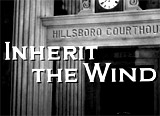
|
Inherit the Wind (1960) In the Tennessee town of Hillsboro, high school teacher Bertram Cates (Dick York) tested a state criminal statute that forbade the teaching of the theory of evolution in public schools. Three-time Presidential candidate and literal fundamentalist Matthew Harrison Brady (Fredric March) (portraying William Jennings Bryan) volunteered to prosecute the case. A media hoopla and hysterical frenzy was whipped up in the sweltering hot town by opposing forces. [The case of science vs. religion was based on the historic Scopes Monkey Trial of 1925 in Dayton, Tennessee.] Cynical and sarcastic newspaper reporter E.K. Hornbeck (Gene Kelly) (portraying Baltimore newspaper journalist H. L. Mencken) was behind the selection of notorious agnostic Henry Drummond (Spencer Tracy) (portraying Clarence Darrow) to defend the school teacher. At first, Drummond was frustrated by the trial, so he summoned Brady to the stand to interrogate him about his literal interpretations of the Bible. Through intense questioning, Brady was forced to admit that the Bible could be interpreted non-literally. Verdict: Brady's admission opened the door to the idea that evolution was consistent with Biblical teaching. However, the conservative jury convicted Cates (at Drummond's request), while the Judge (Henry Morgan) (to avoid further controversy) leniently fined Cates only $100. As Brady struggled to deliver one final religious defense as everyone dispersed, he had a stroke, collapsed and died. |

|
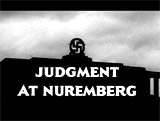
|
Judgment at Nuremberg (1961) During the Nuremberg war crime trials (which occurred during the post-war years from 1945-1949), crimes against humanity (Nazi atrocities) were prosecuted. Three years of trials had passed, and most of the major Nazis had been tried. There were four additional German judges who were brought to trial in 1948 - for using their offices to swear allegiance to Nazi policies, and conduct Nazi sterilization and cleansing policies. The main trial judge was retired American Dan Haywood (Spencer Tracy) in a three-man judiciary, while the defendants were represented by Hans Rolfe (Maximilian Schell), and the prosecutor was strident and vicious Colonel Tad Lawson (Richard Widmark), known for liberating the camps. One of the four defendants was well-reknowned author and professor Ernst Janning (Burt Lancaster), who objected to the trial altogether and remained silent. There were specifically two claims against Janning, who eventually testified under oath: (1) the Feldenstein case (Janning condemned elderly Jew Feldenstein to death for having sex with Irene Hoffman (Judy Garland), an Aryan, to abide by the Nazi's Racial Pollution law); and (2) the Petersen case (Janning had approved the sterilization of Rudolph Petersen, because he was 'feeble-minded'). Verdict: Judge Haywood sentenced each of the four judges to life imprisonment, although the decision was not unanimous. As Rolfe predicted, none of those condemned to a sentence less than death at any of the Nuremberg trials was still serving their term just over a decade later. All of the judges were released within a few years. |
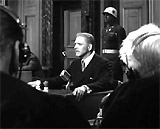
|
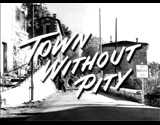
|
Town Without Pity (1961) This grim, provocative and daring crime drama was based on the 1960 German novel The Verdict by Manfred Gregor. It was set in post-WWII Neustadt, Germany (occupied by US troops), where four drunk and off-duty GI soldiers were charged with the gang-rape of local 16 year-old Karin Steinhof (Christine Kaufmann). The four defendants were Sgt. Chuck Snyder (Frank Sutton), Corporal Birdwell "Birdie" Scott (Richard Jaeckel), Private Joey Haines (Mal Sondock) and Corporal Jim Larkin (Robert Blake). According to reports, just before the alleged rape, the young girl had fought with her 19 year-old student boyfriend Frank Borgmann (Gerhart Lippert) while swimming in a bikini (after which she was changing out of her swim suit and was confronted naked - and raped). The entire town had no pity for the decidedly-guilty defendants, neither the obstinate father Karl Steinhof (Hans Nielsen) or the burgermeister (Egon von Jordan), who sought the death penalty. They were defended by tenacious outside counsel Major Steve Garrett (Kirk Douglas), who was opposed by prosecutor Colonel Jerome Pakenham (E.G. Marshall). Verdict: The trial was held in the town's school gymnasium. In order for the death penalty to be applied, Garrett was reluctantly forced to question and attack the victim on the witness stand. With taunts and smears to sully and tarnish her reputation, he was able to break down her testimony so that lesser charges would be applied. The four American soldiers received dishonorable discharges and long jail/prison sentences (ranging from six months to 25 years) rather than the maximum sentence of death. And as a result of her damaged and discredited reputation following the trial, the distraught girl committed suicide by drowning herself in the water near where the rape occurred. |
 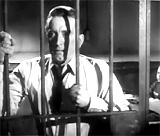 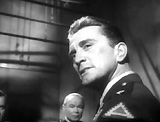 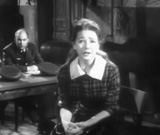
|
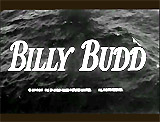
|
Billy Budd (1962, UK) Based upon Herman Melville's short 1924 novel, a compelling adventure drama and war film. In 1797, Britain and France were warring nations in the Napoleonic Wars. Innocent, honest, good-natured and naive British merchant seaman Billy Budd (Terence Stamp) was impressed to serve on the HMS Avenger, and soon became very popular and charismatic among the crew. The Royal Navy's ship was captained by Edwin Fairfax Vere (Peter Ustinov), assisted by the cruel and sadistic Master of Arms John Claggart (Robert Ryan). During an incident on board the ship, Budd aided a sick crewman named Enoch Jenkins (Ronald Lewis), who ultimately fell to his death after being ordered by Claggart to report to his post. During an inquiry into the death, held in the Captain's cabin, Claggart - who had developed a vengeful hatred for Budd, perjured himself when he falsely accused Budd of conspiring and organizing a mutiny. When Budd attempted to defend himself, he stammered (under the pressure) and struck out at Claggart - and killed him with one blow (witnessed by the captain). Budd faced a court-martial hearing, presided over by three judges: 2nd Lieutenant Julian Radcliffe (John Neville), Gunnery Officer Steven Wyatt (David McCallum), and 1st Lieutenant Philip Seymour (Paul Rogers). Verdict: The judges fully supported Budd during deliberations - they believed that Claggart had falsely accused Budd of mutiny, and they thought that Claggart's death was merely an accident. Although the three wished to exonerate Budd, Captain Vere (who wasn't eligible to be one of the judges) then convincingly intervened, and argued that the law explicitly stated that an impressed crew member had to face the death penalty if he struck (and killed) an officer - there couldn't be any exceptions. Budd was convicted, and as he was hanged from the yardarm, Budd heroically cried out: "God bless Captain Vere," causing the guilt-ridden Captain to abdicate and lose command of his ship. The crew was on the verge of mutiny - at the same time that a French vessel attacked the HMS Avenger and set it on fire, and Captain Vere was crushed and killed by falling rigging. |
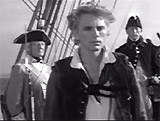
|
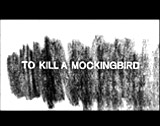
|
To Kill a Mockingbird (1962) In this inspiring courtroom drama, always rated as one of the finest, Scout Finch (Mary Badham) living in Maycomb, Alabama flashbacked as an adult to her 1930s youth, where her family included her widowed, lawyering father Atticus Finch (Gregory Peck), and her brother Jem (Phillip Alford). Neighboring them was a mysterious recluse that they named Boo Radley (Robert Duvall). Atticus took the impossible task of defending black man Tom Robinson (Brock Peters) on false charges of beating and raping a white-trash woman, Mayella Ewell (Collin Wilcox). During the trial, Mayella claimed that Tom had helped her with chores, then attacked her in the house. Her racist, alcoholic, redneck father Bob Ewell (James Anderson) claimed he saw the attack. Tom testified that Mayella often asked him over, and due to her perceived loneliness and that he felt sorry for her, he often assisted her. On this occasion, she grabbed and kissed him, sexually attracted to him. During the trial, Atticus argued persuasively that left-handed, angered Bob struck Mayella, causing facial injuries on one side of her face. One-handed and right-handed Tom couldn't have caused the bruises. Verdict: The all-white jury convicted Tom, and shortly after when he tried to escape, he was shot and killed by a deputy. Ewell remained angered with Atticus, spit in his face, and then attacked Jem and Scout as they walked home one night from a school event. Boo came from nowhere, and stuck a knife in Ewell's belly, and saved them. The Sheriff Heck Tate (Frank Overton) decided to hush the murder and claim that Ewell fell on his own knife, thereby saving Boo (from being killed like a mockingbird).. |
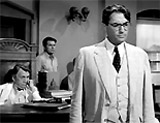
|
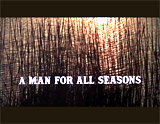
|
A Man For All Seasons (1966, UK) 16th century England's great lawyer and judge and a devout Catholic, Sir Thomas More (Paul Scofield), the new Lord Chancellor after the death of Cardinal Wolsey (Orson Welles) in 1529, refused to grant King Henry VIII (Robert Shaw) support for a divorce to his own brother's widow, Catherine of Aragon, who had proven to be infertile. Henry was intent on having his wife bear a male heir to continue his dynastic reign, so he set his sights on Anne Boleyn (Vanessa Redgrave). Determined to break from Rome, Henry renounced papal authority and declared himself the head of the Anglican Church, known as the Act of Supremacy. Hence, he annuled his current marriage and wed Anne (who was then crowned as Queen in 1533). The new Archbishop of Canterbury upheld the marriage. Thomas Cromwell (Leo McKern) in Parliament passed a law requiring all English subjects to take an oath of allegiance to accept Henry's will, but More refused to accept the heresy and publically endorse Henry - and was imprisoned for a year in the Tower of London. Then, More was put on trial for treason, with perjured testimony by Richard Rich (John Hurt). Verdict: More was quickly found guilty in a sham trial. When he finally was able to defend himself, he made an impassioned speech that denounced the king. More forgave his executioner before he was beheaded - and became a revered martyr. |

|
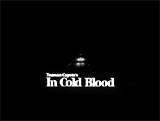
|
In Cold Blood (1967) Richard Brooks' adaptation of Truman Capote's best-selling 1966 non-fiction novel was about two ex-con, paroled drifters who were involved in a horrific set of murders. Charming and arrogant Richard "Dick" Hickock (Scott Wilson) and violence-prone, unstable, and quiet Perry Smith (Robert Blake) committed a brutal mass murder crime (the robbery-gone-bad was delayed in the film and shown mostly as a post-crime scene flashback) against the four-member Herbert Clutter family in rural Holcomb, Kansas (November 15, 1959) in the western part of the state. The two drifters were looking for $10,000, and ended up with only $40. Once the two were apprehended for violating parole, car theft and passing bad checks, it was determined that they were the perpetrators of the quadruple murder after the two were separated and confessed (with conflicting stories). Although it was clear that Perry had committed the murders, Hickock was his active accomplice. Verdict: During the trial, the Prosecutor (Will Geer) effectively argued to the jury about the necessity for capital punishment, because life imprisonment would mean possible parole in only 7 years. He also quoted from The Ten Commandments "Thou Shalt Not Kill": ("If you allow them life imprisonment, they will be eligible for parole in seven years. That is the law. Gentlemen, four of your neighbors were slaughtered like hogs in a pen by them. They did not strike suddenly in the heat of passion, but for money. They did not kill in vengeance. They planned it for money. And how cheaply those lives were bought: $40 dollars, $10 dollars a life...They who had no pity, now ask for yours. They who had no mercy, now ask for yours. They who had no tears, now ask for yours. If you have tears to shed, weep not for them, weep for their victims. From the way the Holy Bible was quoted here today, you might think the word of God was written only to protect the killers. But they didn't read you this: Exodus 20, verse 13: 'Thou shalt not kill.' Or this, Genesis 9, verse 12: 'Who so shedeth man's blood, by man shall his blood be shed.'"). After being convicted and found guilty of the crime (bloody footprints matched the soles of their shoes), the two sentenced killers waited for five years on death row in the Kansas State Penitentiary. In the dramatic ending, both were executed by hanging (on April 14, 1965), Dick first, and then Perry. |
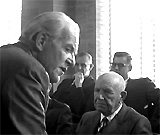  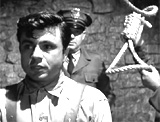
|